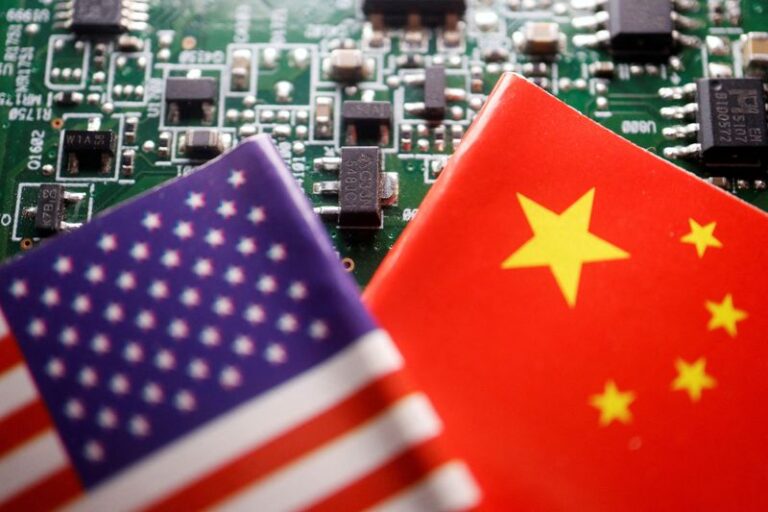Yoon Ah Mun and Ankur Banerjee
SINGAPORE (Reuters) – Asian semiconductor shares slumped on Thursday, following a sharp drop on Wall Street after reports that the United States is considering tightening export controls on advanced semiconductor technology to China.
The hardest hit was shares of Taiwan Semiconductor Manufacturing Co. (TSMC), the world’s largest contract chipmaker, whose market capitalization fell by about NT$2 trillion ($61.35 billion) in two days.
TSMC is due to report earnings later on Thursday but has been hit with a double blow this week by reports of U.S. restrictions and comments from Republican presidential candidate Donald Trump that Taiwan should pay more for its defense.
TSMC shares fell more than 3%, following in the footsteps of other tech giants such as South Korean chipmakers Samsung Electronics and SK Hynix (down 1.85% and 4.1%, respectively) and Japan’s Tokyo Electron (down more than 8%).
The Global X Asia Semiconductor ETF fell 2.7%, reducing its annual gain to 13.5%.
A Bloomberg News report published during Asian trading hours on Wednesday said President Joe Biden’s administration is considering a measure known as the Foreign Direct Product Rule that would allow the U.S. government to block the sale of products made with U.S. technology.
That could mean restrictions on companies such as Tokyo Electron and Dutch company ASML.
TSMC’s American depositary receipts fell 8% on Wednesday. In its first-quarter earnings report, TSMC said 69% of its revenue came from North American customers and 9% from China.
Washington has been protective of the U.S. chip-making industry, which it sees as strategically important in the race against China, raising investor concerns.
“Macro and geopolitical factors appear to have played a bigger role than fundamentals,” said Kang Jin-hyuk, an analyst at Shinhan Securities in Seoul.
Kang pointed to recent strong earnings reports from Samsung and ASML, but noted that ASML’s sales to China are so high that it is targeted by the proposed U.S. regulations.
China accounted for about 49% of ASML’s second-quarter lithography system sales and about 20% of its order backlog.
ASML shares fell more than 10% on Wednesday despite the company showing increased artificial intelligence-related orders and reporting better-than-expected second-quarter profits.
The Biden administration has moved aggressively to restrict China’s access to cutting-edge chip technology, including sweeping regulations issued in October to restrict exports of AI processors designed by companies such as AI darling Nvidia.
Recent tensions between the U.S. and China appear to be accelerating early signs that investors are shifting money out of big tech stocks and into smaller value companies on the belief that lower U.S. interest rates will benefit smaller companies.
“Positioning has become quite extreme in the semiconductor and AI sectors and the comments about import restrictions have triggered risk aversion,” said John Wither, who manages an Asia special situations hedge fund at Pictet Asset Management.
Tech stocks have been doing well this year, fuelled by the global AI boom, with the Nasdaq up 20% and the S&P 500 soaring 17%.
But selling in Asia on Thursday sent major bourses lower, with Tokyo’s Nikkei falling 2 percent and Taiwan’s shares dropping 2.3 percent.
South Korea’s benchmark stock index, the KOSPI, fell 1.34%. Hong Kong’s Hang Seng Tech Index fell 1.5%.
(1 dollar = 32.6010 Taiwanese dollars)
(Reporting by Yoon Ah Mun in Seoul, Janny Kao in Taipei and Ankur Banerjee in Singapore; Writing by Ray Wee; Editing by Vidya Ranganathan and Jamie Freed)


